The seventh day and second week of the 3rd summer course on food with the theme of Local Indigenous Functional Food’s Roles in The Era of Covid-19 Pandemic: From Farm to Table was held on July 19th, 2021. On this day, the event began with a small game to create a fun atmosphere. Then, the activity was divided into four sessions, including virtual trip and discussion, material elaboration by Assoc. Prof. Makoto Takahashi from University of the Ryukyus Japan, Assoc. Prof. Dr. Nathdanai Harnkarnsujarit from Kasetsart University Thailand and Assoc. Prof. Dr. Chaleedaa Borompihai from Chulalungkorn University Thailand. In the first session, the participants joined virtual community visits. From the virtual field trip, it could be implied that traditional medicine contains good compounds for natural remedies and Herbal supplements considering to be safe because it’s natural. Afterwards the participats had a group discussion with their group member about the pros and cons of using traditional medicine and herbal supplements.
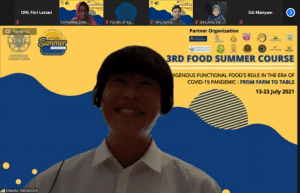 In the second session, Professor Makoto delivered the lecture about “Effective use of Food System Biomass Present in Okinawa, Japan”. Prof. Makoto explained about : economic bio-surfactant production from sugarcane resources, studies on nanometer-size capsules containing food materials, and anti-stress effect of brown sugar produced from sugarcane. Sugar in all tropical and subtropical areas in the world is obtained mainly from sugarcane and beet. It is high in sucrose and other bioactive components such as minerals, phenolic components, and policosanol. Prof Takahashi also explained the basic theory of emulsion and interfacial activity and surfactants specifically, surface-active compounds as a product of biotransformation by microorganisms (bacteria and yeast). He then explained the production of biosurfactants from mollasses and sugar cane juices. It was then followed by a lecture on the application of nanometer-size capsules containing food materials. The lecture was concluded with information on the anti-stress effect of brown sugar produced by sugarcane.
In the second session, Professor Makoto delivered the lecture about “Effective use of Food System Biomass Present in Okinawa, Japan”. Prof. Makoto explained about : economic bio-surfactant production from sugarcane resources, studies on nanometer-size capsules containing food materials, and anti-stress effect of brown sugar produced from sugarcane. Sugar in all tropical and subtropical areas in the world is obtained mainly from sugarcane and beet. It is high in sucrose and other bioactive components such as minerals, phenolic components, and policosanol. Prof Takahashi also explained the basic theory of emulsion and interfacial activity and surfactants specifically, surface-active compounds as a product of biotransformation by microorganisms (bacteria and yeast). He then explained the production of biosurfactants from mollasses and sugar cane juices. It was then followed by a lecture on the application of nanometer-size capsules containing food materials. The lecture was concluded with information on the anti-stress effect of brown sugar produced by sugarcane.
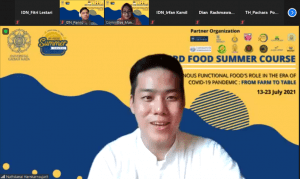 In the third session, Dr. Nathdanai Harnkarnsujarit delivered a lecture on “Packaging Technology, Trend and Labelling for Functional Foods.” Dr. Nathdanai started the lecture with an introduction to art science in packaging technology. One of the sciences is packaging technology in food products. The first step to determine the suitable packaging was identifying the food deterioration and spoilage of the targeted food product. The next step was selecting packaging materials and equipment, evaluating prototype packages, and testing them in the market. He proceeded by giving information on smart packaging. Smart packaging was associated with active packaging. Active packaging changes the condition of the packed food to extend shelf life or improve safety or sensory properties while maintaining the quality of packaged food. Before closing his session, Assoc. Prof. Dr Nathdanai Harnkarnsujarit explained that the recent pandemic creates new opportunities in the functional food industry since there is a shift in consumer behavior towards healthier products. In addition, when designing the package, the producer should consider not only the convenience of the consumer. Lastly, packaging sustainability should also be a concern because of its effect on the environment.
In the third session, Dr. Nathdanai Harnkarnsujarit delivered a lecture on “Packaging Technology, Trend and Labelling for Functional Foods.” Dr. Nathdanai started the lecture with an introduction to art science in packaging technology. One of the sciences is packaging technology in food products. The first step to determine the suitable packaging was identifying the food deterioration and spoilage of the targeted food product. The next step was selecting packaging materials and equipment, evaluating prototype packages, and testing them in the market. He proceeded by giving information on smart packaging. Smart packaging was associated with active packaging. Active packaging changes the condition of the packed food to extend shelf life or improve safety or sensory properties while maintaining the quality of packaged food. Before closing his session, Assoc. Prof. Dr Nathdanai Harnkarnsujarit explained that the recent pandemic creates new opportunities in the functional food industry since there is a shift in consumer behavior towards healthier products. In addition, when designing the package, the producer should consider not only the convenience of the consumer. Lastly, packaging sustainability should also be a concern because of its effect on the environment.
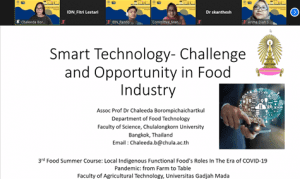 The last session of the lecture was delivered by Assoc. Prof. Dr. Chaleedaa Borompihai about “Smart Technology-Challenge and Opportunity in Food Industry 4.0”. Dr. Chaleedaa opened the lecture with a brief introduction Departement of Food Technology, Chulalongkorn University. She then explained the development of the food industry from food industry 1.0 to food industry 4.0. Industry 4.0 aggregates existing ideas into a new value chain that plays a crucial role in transforming whole value chains of life cycles of goods while developing innovative products in manufacturing that involve the connection of systems and things that create self-organizing and dynamic control organization. In addition, it focuses on food servicing by using cyber-physical systems to monitor, analyze, and automate business. There are challenges and opportunities in doing Industry 4.0 but we must preserve and study the challenges to overcome them. Examples of challenges are knowledge of using technology, cost of implementation and investment, employment of high skills labor, technology disruption, and deep research that supports the use of technology and funding. Then Dr. Chaleedaa Borompichaichartkul explained the importance of design thinking as a systemic approach to start understanding innovation. There are five keywords including empathize (innovation should be human-centered), define (innovation should solve a problem), ideate (innovation is born from a clash of ideas), prototype (innovation should be brought to life), and test (innovation should be refined). The day 7th of the 3rd Summer Course was ended with the participant performing an independent study on the packaging design, claim, and technology they will use for their Final Project.
The last session of the lecture was delivered by Assoc. Prof. Dr. Chaleedaa Borompihai about “Smart Technology-Challenge and Opportunity in Food Industry 4.0”. Dr. Chaleedaa opened the lecture with a brief introduction Departement of Food Technology, Chulalongkorn University. She then explained the development of the food industry from food industry 1.0 to food industry 4.0. Industry 4.0 aggregates existing ideas into a new value chain that plays a crucial role in transforming whole value chains of life cycles of goods while developing innovative products in manufacturing that involve the connection of systems and things that create self-organizing and dynamic control organization. In addition, it focuses on food servicing by using cyber-physical systems to monitor, analyze, and automate business. There are challenges and opportunities in doing Industry 4.0 but we must preserve and study the challenges to overcome them. Examples of challenges are knowledge of using technology, cost of implementation and investment, employment of high skills labor, technology disruption, and deep research that supports the use of technology and funding. Then Dr. Chaleedaa Borompichaichartkul explained the importance of design thinking as a systemic approach to start understanding innovation. There are five keywords including empathize (innovation should be human-centered), define (innovation should solve a problem), ideate (innovation is born from a clash of ideas), prototype (innovation should be brought to life), and test (innovation should be refined). The day 7th of the 3rd Summer Course was ended with the participant performing an independent study on the packaging design, claim, and technology they will use for their Final Project.

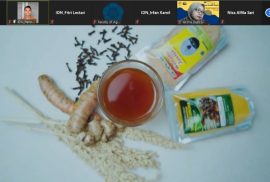
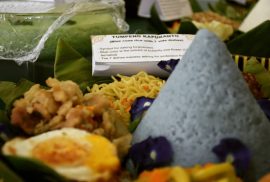
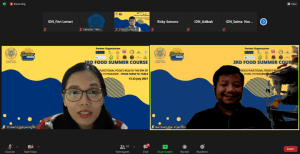 The second session, the lecture was delivered by Dr. Widiastuti Setyaningsih about “Extraction of Active Compounds from Edible Flowers”. Dr. Widi explained about her research, which extraction of active compounds from edible flowers, the essentials of edible flower and analytical methods to take advantage of the edible flowers. The major compound in bioactive compounds included in fruit flowers and ornamental flowers is the phenolic acid. This compound makes edible flowers have many functionality such as the antioxidant, anti-inflammatory, antimicrobial, anticancer, neuroprotective agent, antidiabetic, uricosuric agent, and anti-hemolytic. To optimize the results of phenolic components, extraction methods were developed including maceration, UAE (ultrasound-assisted extraction) and MAE (microwave-assisted extraction).
The second session, the lecture was delivered by Dr. Widiastuti Setyaningsih about “Extraction of Active Compounds from Edible Flowers”. Dr. Widi explained about her research, which extraction of active compounds from edible flowers, the essentials of edible flower and analytical methods to take advantage of the edible flowers. The major compound in bioactive compounds included in fruit flowers and ornamental flowers is the phenolic acid. This compound makes edible flowers have many functionality such as the antioxidant, anti-inflammatory, antimicrobial, anticancer, neuroprotective agent, antidiabetic, uricosuric agent, and anti-hemolytic. To optimize the results of phenolic components, extraction methods were developed including maceration, UAE (ultrasound-assisted extraction) and MAE (microwave-assisted extraction).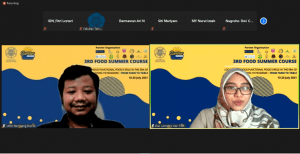 The third session, the material elaboration by Dr. Dwi Larasatie about “Functional Food Product Development”. Dr. Dwi started the lecture with learning three generic perspectives, including business development perspective, company perspective, and product development perspective. Dr. Dwi also explained about the role of customer and market evaluation, marketing plans, production and product launching. Dr. Dwi explains the material then participants practice the material that has been explained and closed by presentations from several participants.
The third session, the material elaboration by Dr. Dwi Larasatie about “Functional Food Product Development”. Dr. Dwi started the lecture with learning three generic perspectives, including business development perspective, company perspective, and product development perspective. Dr. Dwi also explained about the role of customer and market evaluation, marketing plans, production and product launching. Dr. Dwi explains the material then participants practice the material that has been explained and closed by presentations from several participants.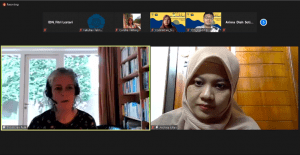 The last session, the lecture was delivered by Prof. Saskia van Ruth from Wageningen University and Research, The Netherland, about “Food Fraud Prevention and Detection in Herbs and Spices and Supply Chain Networks”. Prof. Saskia opened the lecture discussing fraud in every aspect of life. And she focused it on food fraud including deceit and it was done on purpose and for raking more money. The first main topic is discussing factors in food frauds’ aspect are ingredients and constituents, geographical origin, production system, and processing. Spices are the most expensive products in the supermarket so it is the most fragile type of food that gets fraud. Also the longer the supply chains are the more misty, and could become easier and more tempting to do food fraud. Economic drives also play a big role as the price of the specific food is increasing the more people want to commit food fraud for their own profits.Prof. Saskia also presented her survey regarding students’ integrity quiz. The results of the survey was that dishonesty is everywhere, not just in food fraud. There are also many fraud monitoring detection methods, including chromatography, mass spectrometry, DNA based techniques, immunology, physical test, wet chemistry, etc. Prof. Saskia ended the lecture by mentioning the system and the development in preventing food fraud in the future heading for analyses of integrated decision support tools (ICT systems), big data and citizen science.
The last session, the lecture was delivered by Prof. Saskia van Ruth from Wageningen University and Research, The Netherland, about “Food Fraud Prevention and Detection in Herbs and Spices and Supply Chain Networks”. Prof. Saskia opened the lecture discussing fraud in every aspect of life. And she focused it on food fraud including deceit and it was done on purpose and for raking more money. The first main topic is discussing factors in food frauds’ aspect are ingredients and constituents, geographical origin, production system, and processing. Spices are the most expensive products in the supermarket so it is the most fragile type of food that gets fraud. Also the longer the supply chains are the more misty, and could become easier and more tempting to do food fraud. Economic drives also play a big role as the price of the specific food is increasing the more people want to commit food fraud for their own profits.Prof. Saskia also presented her survey regarding students’ integrity quiz. The results of the survey was that dishonesty is everywhere, not just in food fraud. There are also many fraud monitoring detection methods, including chromatography, mass spectrometry, DNA based techniques, immunology, physical test, wet chemistry, etc. Prof. Saskia ended the lecture by mentioning the system and the development in preventing food fraud in the future heading for analyses of integrated decision support tools (ICT systems), big data and citizen science.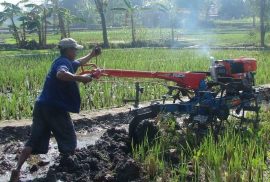
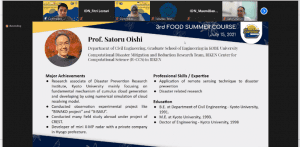 In the first session, the material elaboration by Prof. Satoru Oishi about “Practical Application of Weather Radar Information in Japan.” In this session, Prof. Satoru explained the potency of disaster in Japan. Because in Japan, natural disasters often occur, the government and academic universities make innovations and development to minimize its impact. Mini Radar Development is called “Furuno.” Furuno, as compact weather radar, can be used for different purposes. There are energy, recreation, agriculture, water treatment, operation management, and disaster prevention. Prof Oishi also explained in the presentation that the difference between this Furuno Radar to the regular weather forecast report from the local officials or even weather forecast application in the smartphone. The display image shows information about the forecast water level at a point and in the river. We can calculate the water level very accurately with this data and graph.
In the first session, the material elaboration by Prof. Satoru Oishi about “Practical Application of Weather Radar Information in Japan.” In this session, Prof. Satoru explained the potency of disaster in Japan. Because in Japan, natural disasters often occur, the government and academic universities make innovations and development to minimize its impact. Mini Radar Development is called “Furuno.” Furuno, as compact weather radar, can be used for different purposes. There are energy, recreation, agriculture, water treatment, operation management, and disaster prevention. Prof Oishi also explained in the presentation that the difference between this Furuno Radar to the regular weather forecast report from the local officials or even weather forecast application in the smartphone. The display image shows information about the forecast water level at a point and in the river. We can calculate the water level very accurately with this data and graph.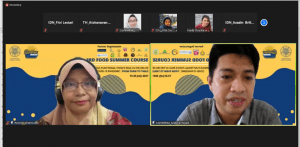 In the third session, the lecture was delivered by Prof. Ts. Dr. Rosnah Shamsudin about “Drying Plants, Herbs, and Species to Preserve Their Active Compounds.” Professor Rosnah divided her material into three sub-topics, including introducing plants, herbs, species, and active compounds, preserving active compounds by using drying methods, and the different types of drying methods. There are various types of herbs and spices used to make our food more delicious or have the advantage of making our life healthier. Advances in dehydration techniques and the development of novel drying methods have in recent years enabled the preparation of a wide range of dried products and convenience foods, meeting the quality, stability, and functional requirements coupled with the economy.
In the third session, the lecture was delivered by Prof. Ts. Dr. Rosnah Shamsudin about “Drying Plants, Herbs, and Species to Preserve Their Active Compounds.” Professor Rosnah divided her material into three sub-topics, including introducing plants, herbs, species, and active compounds, preserving active compounds by using drying methods, and the different types of drying methods. There are various types of herbs and spices used to make our food more delicious or have the advantage of making our life healthier. Advances in dehydration techniques and the development of novel drying methods have in recent years enabled the preparation of a wide range of dried products and convenience foods, meeting the quality, stability, and functional requirements coupled with the economy.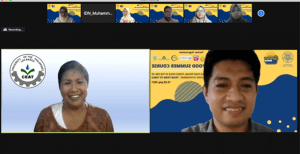 In the last session, the material elaboration by Prof. Rossana Cablyan-Amongo about “Agricultural Machinery.” Prof Rossana divided the lecture into seven topics: production systems, prime movers, tillage machinery and equipment, crop establishment machinery, crop care machinery, water pumping equipment, and harvesting and threshing machinery. She said the source of power on the farm is human power, animal power, electric motors, internal combustion engines, and renewable energy. As the oldest source of power, humans or manpower are still considered one of the significant sources because of the size of the farm, topography, crops grown, and availability of low-cost labor.
In the last session, the material elaboration by Prof. Rossana Cablyan-Amongo about “Agricultural Machinery.” Prof Rossana divided the lecture into seven topics: production systems, prime movers, tillage machinery and equipment, crop establishment machinery, crop care machinery, water pumping equipment, and harvesting and threshing machinery. She said the source of power on the farm is human power, animal power, electric motors, internal combustion engines, and renewable energy. As the oldest source of power, humans or manpower are still considered one of the significant sources because of the size of the farm, topography, crops grown, and availability of low-cost labor.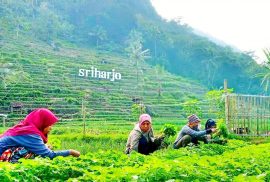
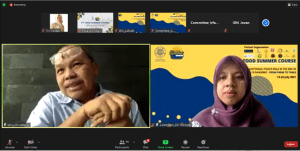 In the second session, the lecture was delivered by Prof. Lilik Sutiarso about “Sustainable Agriculture: a case study in Sriharjo Village”. In his lecture, Prof. Lilik explained about the concept of the bio-circular-green (BCG) economy. The concepts of circular economy, green economy, and bio-economy are joined by the common ideal to reconcile economic, environmental, and social goals. It is a concept that has been developed for a long time. The concept integrates economic, social, and environmental. This concept will provide opportunities including industry, government, and private systems to work together in an interconnected system.
In the second session, the lecture was delivered by Prof. Lilik Sutiarso about “Sustainable Agriculture: a case study in Sriharjo Village”. In his lecture, Prof. Lilik explained about the concept of the bio-circular-green (BCG) economy. The concepts of circular economy, green economy, and bio-economy are joined by the common ideal to reconcile economic, environmental, and social goals. It is a concept that has been developed for a long time. The concept integrates economic, social, and environmental. This concept will provide opportunities including industry, government, and private systems to work together in an interconnected system.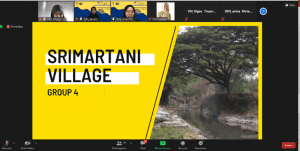 Therefore, the last session was the group presentation based on the results of the brainstorming about the advantages and disadvantages of implementing Agro-ecotourism and the utilization of agricultural machinery of the video that has been conducted in the morning session. This session was guided by Dr. Ngadisih to guide the participant’s group presenting their group discussion regarding the assigned topic by the committee.
Therefore, the last session was the group presentation based on the results of the brainstorming about the advantages and disadvantages of implementing Agro-ecotourism and the utilization of agricultural machinery of the video that has been conducted in the morning session. This session was guided by Dr. Ngadisih to guide the participant’s group presenting their group discussion regarding the assigned topic by the committee.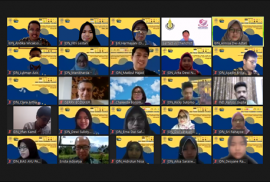
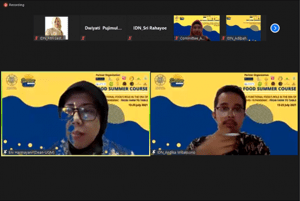 After the opening ceremony continued with 3 sessions of material delivered by Prof. Eni Harmayani, Prof. Unnikhrisnan, and Prof. Gerard Bodeker. The first session was delivered by Prof. Dr. Eni Harmayani, the Dean of Faculty of Agricultural Technology UGM with the topic “Functional Food Development of Local Resources”. In this section, Prof. Eni described the definition of functional food, why are foods called functional food, and functional food from Indonesia. Many local resources can be developed into functional food, such as Glucomannan from Porang, Mocaf from Cassava flour, sweet potato fiber, and Arrowroot flour. Indonesia also has Jamu (Indonesian herbal medicine) and Spices in Indonesia as a functional food.
After the opening ceremony continued with 3 sessions of material delivered by Prof. Eni Harmayani, Prof. Unnikhrisnan, and Prof. Gerard Bodeker. The first session was delivered by Prof. Dr. Eni Harmayani, the Dean of Faculty of Agricultural Technology UGM with the topic “Functional Food Development of Local Resources”. In this section, Prof. Eni described the definition of functional food, why are foods called functional food, and functional food from Indonesia. Many local resources can be developed into functional food, such as Glucomannan from Porang, Mocaf from Cassava flour, sweet potato fiber, and Arrowroot flour. Indonesia also has Jamu (Indonesian herbal medicine) and Spices in Indonesia as a functional food.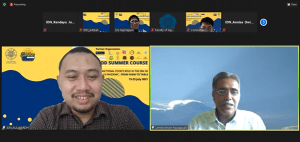 In addition, the second session was given by Prof. Unnikhrisnan Payyapallimanna about Indigenous Food Systems in Promotion of Health – An Ayurvedic (Indian) Perspective. Prof. Unnikhrisnan discussed the sustainability challenges of non-communicable, lifestyle diseases, and malnutrition, links between Biodiversity, Nutrition, and Health and the role of traditional knowledge, and elaborated the traditional food systems, their significance in health and nutrition: An Ayurveda perspective. Other than that, Prof. Unnikhrisnan emphasized that “Diversity enriches the quality of life in health, sensory, social, intellectual, and moral terms and increases options and resilience for building livelihoods in the short term and for the future.”
In addition, the second session was given by Prof. Unnikhrisnan Payyapallimanna about Indigenous Food Systems in Promotion of Health – An Ayurvedic (Indian) Perspective. Prof. Unnikhrisnan discussed the sustainability challenges of non-communicable, lifestyle diseases, and malnutrition, links between Biodiversity, Nutrition, and Health and the role of traditional knowledge, and elaborated the traditional food systems, their significance in health and nutrition: An Ayurveda perspective. Other than that, Prof. Unnikhrisnan emphasized that “Diversity enriches the quality of life in health, sensory, social, intellectual, and moral terms and increases options and resilience for building livelihoods in the short term and for the future.”